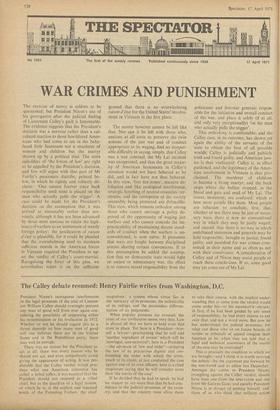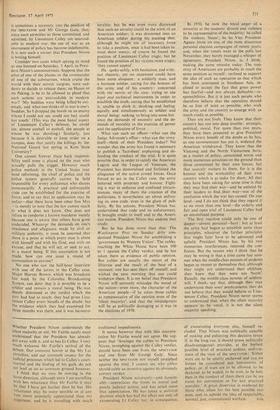The Calley debate resumed: Henry Fairlie writes from Washington, D.C.
President Nixon's outrageous interferences in the legal processes of the trial of Lieuten- ant William Calley should overnight prevent any man of good will from ever again con- sidering the possibility a supporting either his re-nomination or his re-election in 1972. Whether or not he should regard this as a threat depends on how many men of good will one believes there are in the United States and in the Republican party; there may well be enough. There was no reason for the President to act at all; there was every reason why he should not act, and even scrupulously avoid giving the appearance of acting. It was pre- dictable that the Calley verdict would pro- duce what one American columnist has called a tribal reflex; it was essential that the President should not respond as a tribal chief, but as the guardian of a legal system, of which he is, in the explicit and repeated words of the Founding Fathers, the chief
magistrate: a system whose virtue lies in the intricacy of its processes, the technicality of its rulings, and the passionless differen- tiation of its judgments.
When popular passions are aroused, the crust of our civilisation seems very thin. Law is almost all that we have to hold even that crust in place. Yet here is a President—him- self a lawyer—proclaiming that he will add 'another ingredient of review' which will be 'non-legal, non-technical'; here is a President —the advocate of law and order'—stripping the law of its precarious dignity and con- founding the order with which the army, much to its credit, at last conducted the case against one of its own officers; here is a chief magistrate saying that he will consider more than 'the merits of the case'.
If he decided that he had to speak, Ile had no reason to say more than that he had con- fidence in the judicial processes of the coun- try, and that the country must allow them
to take their course, with the implicit under- standing that at some time the verdict would come under his--or his successor's—review; in fact, if he had been guided by any sense of responsibility, he had every reason to say only that, and not a word more. But now he has undermined the judicial processes; for what can those who sit on future boards of review or tribunals of appeal imagine their function to be, when they are told that a legal and technical assessment of the merits of the case may be overruled?
This is precisely the condition to which we are brought—and I think it is worth reviving the debate—by the argument put forward by the SPECTATOR and its editor last December. Amongst the cables to President Nixon. inveighing against the Calley verdict, should have been one from the SPECTATOR and one from Mr George Gale; and equally President Nixon is in danger of putting himself, and those of us who think that military action
Whether President Nixon understands the Silent majority or not. Mr Fairlie surely must understand that the President has already got away with it, and so has Lt Calley. 1.very much welcome Mr Fairlie's revival of the debate. Our common horror at the My Lai atrocities. and our commoh respect for the tudicial processes which led to Calley's court- martial and the finding of his guilt, do not Yet lead us on to common ground however. I think that we may be moving in the same direction, although since I am travelling with less reluctance than Mr Fairlie it may he that 1 have got further than he has. His reluctance may be more sensible or at any rate more popularly appreciated than my eagerness; and he is travelling with much traditional impedimenta.
It seems however that with this interpre- tation Mr Fairlie would not agree. He sug- gests that 'Amongst the cables to President Nixon. inveighing against the Calley verdict. should have been one from the SPECTATOR and one from Mr George Gale'. Since neither the SPECTATOR nor myself inveighed against the trial. I cannot sec why either should cable an invective against its obviously correct verdict.
President Nixon accurately—and lament- ably—appreciates the limits to moral and purely judicial action, and has acted upon that appreciation. He has taken a political decision which has had the effect not only of exonerating It Calley but, in consequence,
of exonerating everyone else, himself in- cluded. That Nixon was politically capable of making and enforcing this decision (even if. in the long run, it should prove politically disadvantageous) provides, at the highest possible level of practical politics, endorse- ment of the view of the SPECTATOR: 'Either wars arc to be utterly eschewed and can no longer be considered just instruments of policy: or. if wars are to he allowed, to be declared, to be waged. to be won, to be lost, then in the conduct of them there can be no room for convention or for any practical morality.' A :great disservice is rendered by those who, often for the best possible rea- sons, seek to uphold the idea of respectable, normal, just, conventionl warfare. (LG.







































 Previous page
Previous page